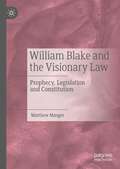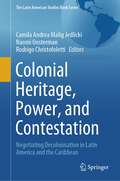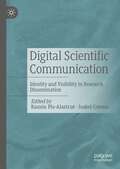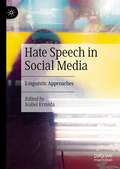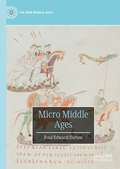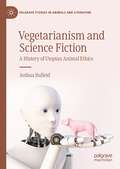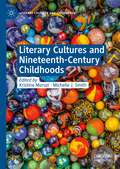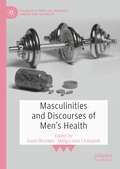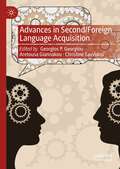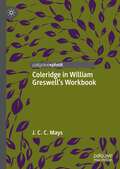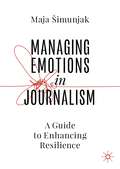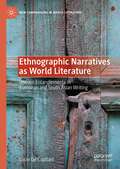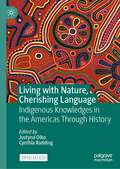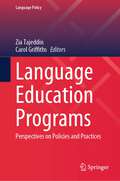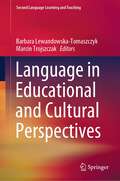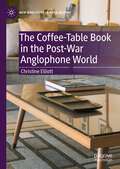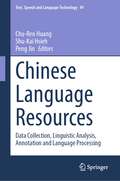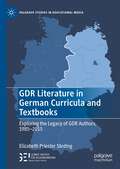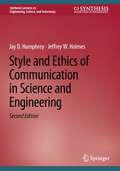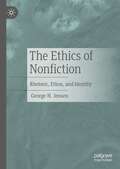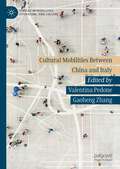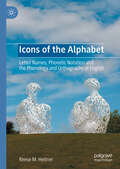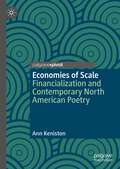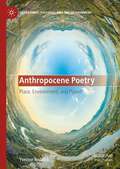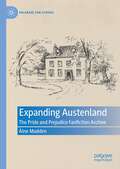- Table View
- List View
William Blake and the Visionary Law: Prophecy, Legislation and Constitution
by Matthew MaugerThis book examines the difficult relationship between individual intellectual freedom and the legal structures which govern human societies in William Blake’s works, showing that this tension carries a political urgency that has not yet been recognised by scholars in the field. In doing so, it offers a new approach to Blake’s corpus that builds on the literary and cultural historical work of recent decades. Blake’s pronouncements about law may often sound biblical in tone; but this book argues that they directly address (and are informed by) eighteenth-century legal debates concerning the origin of the English common law, the autonomy of the judicature, the increasing legislative role of Parliament, and the emergence of the notions of constitutionalism and natural rights. Through a study of his illuminated books, manuscript works, notebook drafts and annotations, this study considers Blake’s understanding that law is both integral to humanity itself and a core component of its potential fulfilment of the ‘Human Form Divine’.
Colonial Heritage, Power, and Contestation: Negotiating Decolonisation in Latin America and the Caribbean (The Latin American Studies Book Series)
by Rodrigo Christofoletti Naomi Oosterman Camila Andrea Malig JedlickiRecent debates about the return of colonially looted heritage have furthered the discussions on decolonisation around the world, and have reignited questions surrounding “what is, and who owns, cultural heritage”. These discourses in the meaning, production and management of heritage – with a growing presence of themes that address “Latinities” – have gained greater visibility in Latin America and the Caribbean, as challenges surrounding cultural heritage arise more prominently worldwide. The attention on this region aims to contextualise the various theoretical, empirical, and critical perspectives in relation to the negotiation of decolonisation. Hence, this book focuses on the analysis of diverse modes of confronting the power underlying colonial heritage that can contribute to pushing boundaries and persuading changes in pre-established definitions of political thought and local identities. To this end, the chapters in this book focus on a wide scope of topics, ranging from the repatriation and restitution of cultural heritage, and diasporic movements to decolonial practices around monuments, museums, and education. In so doing, this volume challenges stereotypes that made Latin America and the Caribbean a space of mere reproducibility of external ideas, and instead provides a space to show current decolonial perspectives and practices developed in the region that will enrich the international debate on the contestation of colonial legacies and decolonisation of cultural heritage.
Digital Scientific Communication: Identity and Visibility in Research Dissemination
by Ramón Plo-Alastrué Isabel CoronaThis edited book analyses current trends in science communication and gathers research on practices related to the construction of digital identity and visibility, emerging conflicts related to the public availability and appropriation of scientific culture, and ways of validating and disseminating scientific knowledge in new digital contexts. Drawing on a selection of papers presented in the InterGedi Conference (Zaragoza, December 2021), the main goal of the volume is to identify and explore emerging professional practices and challenges in the digital communication of science through innovative multimodal genres. This book will be of interest to postgraduates, doctoral students, practitioners and researchers in the fields of discourse analysis, sociolinguistics, digital media, multimodality and communication studies.
Hate Speech in Social Media: Linguistic Approaches
by Isabel ErmidaThis edited book offers insight into the linguistic construction of prejudice and discrimination in social media. Drawing on the outputs of a three-year research project, NETLANG, involving scholars from five European countries (Portugal, Czech Republic, Estonia, Finland and Poland), as well as on external contributions from participants in the project’s final conference, the collection brings together a variety of linguistic approaches to the study of online hate speech, ranging from Pragmatics to Syntax, Lexis, Stylistics, Natural Language Processing (NLP) and Corpus Linguistics. Data from English, Portuguese, Danish, Lithuanian, Persian, Polish, and Slovenian are examined, along with various geopolitical contexts for hate speech, especially anti-refugee and anti-immigrant discourse. The authors explore a continuum of overt to covert textual data, namely: (i) structural elements, such as syntactic and morphological patterns found to recur throughout the texts; (ii) lexical and stylistic elements, revealing the often implicit ways vocabulary choices and rhetorical devices signal the expression of hate; and (iii) interactional elements, concerning the pragmatic relationships established in online communicative exchanges. The chapters cover numerous types of prejudice, such as sexism, nationalism, racism, antisemitism, religious intolerance, ageism, and homo/transphobia. The book will be of interest to an academic readership in Linguistics, Media Studies, Communication Studies, and Social Sciences.
Micro Middle Ages (The New Middle Ages)
by Paul Edward DuttonMicro Middle Ages brings together five microhistorical case studies focusing on small or seemingly inconsequential evidence that leads to broader conclusions about medieval history and the way we do and understand history in general. Paul Dutton provides an overview of microhistorical approaches and theorizes about its use in pre-modern history. As opposed to studying history “from above” or history “from below,” Dutton shows the advantages for historians of doing history “from the inside out,” starting from some single, overlooked, but potentially knowable thing, delving deep inside, and then reattaching it to its time and place. Such an approach has one abiding advantage: its insistence on being grounded in the particularity of the evidence. The book highlights what the microhistorical is, its conceptual and practical challenges. Dutton argues that the attention to the micro has always been with us and is a constitutive, cognitive part of who we are as human beings.
Vegetarianism and Science Fiction: A History of Utopian Animal Ethics (Palgrave Studies in Animals and Literature)
by Joshua BulleidVegetarianism and Science Fiction: A History of Utopian Animal Ethics examines how vegetarian ideals promoted within science fiction and utopian literature have had a real-world impact on the awareness and spread of vegetarianism and animal advocacy, as well as how the genres' engagements have been altered to reflect changes in ethical and environmental philosophy. Author Joshua Bulleid examines the representation of vegetarianism in the works of major science fiction authors, including Mary Shelley, H. G. Wells, Arthur C. Clarke, Philip K. Dick, Ursula K. Le Guin, Ernest Callenbach, Marge Piercy, Octavia E. Butler, Kim Stanley Robinson and Margaret Atwood within their evolving social contexts, tracing the development of vegetarian trends and their science fictional representations from the early-nineteenth century to the present day.
Literary Cultures and Nineteenth-Century Childhoods (Literary Cultures and Childhoods)
by Kristine Moruzi Michelle J. SmithLiterary Cultures and Nineteenth-Century Childhoods explores the construction of the child and the development of texts for children in the nineteenth century through the application of fresh theoretical approaches and attention to aspects of literary childhoods that have only recently begun to be illuminated. This scope enables examination of the child in canonical nineteenth-century novels by Charles Dickens, Elizabeth Gaskell, Charlotte Bronte, and Thomas Hardy alongside well-known fiction intended for young readers by George MacDonald, Christabel Coleridge, and Kate Greenaway. The century was also distinctive for the rise of the children’s magazine, and this book broadens the definition of literary cultures to include magazines produced both by, and for, young people. The volume examines how the child and family are conceptualised, how children are positioned as readers in genres including the domestic novel, school story, Robinsonade, and fantasy fiction, how literary childhoods are written and politicised, and how childhood intersects with perceptions of animals and the natural environment. The range of chapters in this collection and the texts they consider demonstrates the variability and fluidity of literary cultures and nineteenth-century childhoods.
Masculinities and Discourses of Men's Health (Palgrave Studies in Language, Gender and Sexuality)
by Gavin Brookes Małgorzata ChałupnikThis book brings together a collection of case studies that explore the relationship between health and masculinity. It covers various topics related to health, such as mental health, sexual health, eating disorders and coronavirus, and offers health-based perspectives on issues such as migration and gender identity, as these relate to masculinities. In exploring these themes, this book addresses a wide range of communicative contexts, including online forums, interviews, advertising, sex education materials, migrant integration classes, and suicide notes. This book will appeal to linguists interested in health and gender (particularly masculinities), as well as scholars in fields such as psychology, media studies, cultural studies, and other humanities and social science disciplines with a focus on discourse.
Advances in Second/Foreign Language Acquisition
by Georgios P. Georgiou Aretousa Giannakou Christine SavvidouThis book includes studies that employ a variety of research techniques from diverse fields targeting a better understanding of the second language (L2)/foreign language (FL) acquisition process including issues of heritage language (HL) learning. Specifically, the chapters discuss matters such as speech perception and production patterns in a second/foreign language, factors that facilitate second language acquisition, acquisition of heritage languages, teaching of a second/foreign language, and acquisition of second/foreign language grammatical and other structures, among others. The investigation of L2/FL and HLs is of paramount importance for updating the existing theories in the field and maximizing learning outcomes for the sake of effective communication, cultivation of intercultural understanding, career advancement, and personal development. The book is of interest to a wide range of disciplinary audiences, including linguists, psychologists, educators, and social scientists.
Coleridge in William Greswell’s Workbook
by J. C. MaysThis book provides a critical and biographical account of the fascinating hand-made book of rector William Greswell (1848-1923), in which he assembled British and American reviews and accounts of the Romantic poet, critic, philosopher, and religious thinker Samuel Taylor Coleridge (1772-1834). J.C.C. Mays re-evaluates Coleridge’s nineteenth-century reputation through the lens provided by Greswell’s workbook. Mays demonstrates how Coleridge is one of the most complicated and influential religious thinkers of the nineteenth century, whose “religious musings” (most prominently as published in Aids to Reflection and On the Constitution of the Church and State, but also in posthumous collections such as Confessions of an Inquiring Spirit) cast a long shadow over religious thinking in nineteenth-century England and America. Although Greswell was but one of Coleridge’s many readers in the nineteenth century, his engagement with Coleridge’s writings was noteworthy for the sheer mass of the materials he assembled, and the breadth of the Coleridge he depicts. Greswell’s Coleridge is a Coleridge in whom all Coleridgeans will be interested.
Managing Emotions in Journalism: A Guide to Enhancing Resilience
by Maja ŠimunjakThis textbook offers the first practical guide to managing emotions in everyday journalism work based on interviews with more than 30 British journalists. It raises awareness of emotional situations and stressors journalists may face, so practitioners are better able to recognise these and prepare for them, and outlines practical emotion management strategies which they can apply to enhance their emotional intelligence and resilience and consequently, feel and perform better in the workplace. It includes vignettes written by journalists from the United Kingdom, United States, Australia and Croatia, as well as practical scenario exercises that prompt readers to reflect on how they would feel and react in specific situations based on journalists’ everyday work.
Ethnographic Narratives as World Literature: Uneven Entanglements in European and South Asian Writing (New Comparisons in World Literature)
by Lucio De CapitaniThis book links world-literary studies with anthropology and ethnography. It shows how ethnographic narratives can represent a compelling point of departure for world-literary explorations. The volume compares the travel writing and fiction of Robert Louis Stevenson and Rudyard Kipling as colonial ethnographic narratives; the militant writings of Carlo Levi and Mahasweta Devi; and the travelogues and ethnographic fiction of Amitav Ghosh and the literary journalism of Frank Westerman. Each of these readings focuses on a set of social, political and historical circumstances and relies on a dialogue with anthropological theory and history. This book demonstrates how imperialism, colonialism, capitalism and ecology are interdependent, and contributes to methodological debates within both anthropology and world-literary studies.
Living with Nature, Cherishing Language: Indigenous Knowledges in the Americas Through History
by Cynthia Radding Justyna OlkoThis open access book explores the deep connections between environment, language, and cultural integrity, with a focus on Indigenous peoples from early modern times to the present. It illustrates the close integration of nature and culture through historical processes of environmental change in North, Central, and South America and the nurturing of local knowledge through ancestral languages and oral traditions. This volume fills a unique space by bringing together the issues of environment, language and cultural integrity in Latin American historical and cultural spheres. It explores the reciprocal and necessary relations between language/culture and environment; how they can lead to sustainable practices; how environmental knowledge and sustainable practices toward the environment are reflected in local languages, local sources and local socio-cultural practices. The book combines interdisciplinary methods and initiates a dialogue among scientifically trained scholars and local communities to compare their perspectives on well-being in remote and recent historical periods and it will be of interest to students and scholars in fields including sociolinguistics, (ethno)history, linguistic anthropology, cultural studies and cultural anthropology, environmental studies and Indigenous/minority studies.
Language Education Programs: Perspectives on Policies and Practices (Language Policy #34)
by Carol Griffiths Zia TajeddinThis book delves into the realm of effective language education programs, examining them from both macro and micro-policy-making perspectives. It unravels the distinguishing features of exemplary language programs and explores how these programs are implemented in diverse international contexts. The book comprehensively explores various facets of language education programs, encompassing well-crafted language education policies, robust curriculum and syllabus design, impactful teaching materials, effective approaches to English for specific purposes (ESP), English as a medium of instruction (EMI), content and language integrated learning (CLIL), and English as a Lingua Franca (ELF)-informed instruction. The book also delves into fruitful school/institute-university partnerships, the judicious use of technology, strategies for teacher recruitment and professional development, as well as efficient policies for learner assessment, among other topics of significance. The contributions within this book are firmly grounded in data, incorporating findings from empirical studies. The insights provided draw upon valuable data obtained from a range of diverse contexts in which effective language education programs have been implemented.
Language in Educational and Cultural Perspectives (Second Language Learning and Teaching)
by Barbara Lewandowska-Tomaszczyk Marcin TrojszczakThis book comprises 20 chapters that have been divided into two distinct parts: language in educational contexts and language in cultural contexts. The contributions included in this book are the outcome of the conference Contacts and Contrasts that was held in Konin, Poland, in 2021 (C&C2021). The contributions featured in the first part of the part of the book focus on various issues in the field of applied linguistics, in particular language education, second and foreign language learning as well as translator training. The second part of this edited collection features chapters devoted to a range of issues at the intersection of semantics, historical and contact linguistics, as well as literature.
The Coffee-Table Book in the Post-War Anglophone World (New Directions in Book History)
by Christine ElliottThe Coffee-Table Book in the Post-War Anglophone World argues that coffee-table books appeared and became popular in the post-war era at the convergence of three important developments: advances in full colour printing technology, social change, and publishing entrepreneurism and innovation. Examining the coffee-table book through a book history lens acknowledges their significant contribution to post-war visual culture and illustrated publishing. Focussing on post-war America, Great Britain, and Australia during the “golden age” era of the 1950s, 1960s, and 1970s, this history of the coffee-table book takes an interdisciplinary approach to put the coffee-table book in context in regards to materiality, format, printing, status, and genre.
Chinese Language Resources: Data Collection, Linguistic Analysis, Annotation and Language Processing (Text, Speech and Language Technology #49)
by Chu-Ren Huang Shu-Kai Hsieh Peng JinBased on the accumulation of research experience and knowledge over the past 30 years, this volume lays out the research issues posed by the construction of various types of Chinese language resources, how they were resolved, and the implication of the solutions for future Chinese language processing research. This volume covers 30 years of development in Chinese language processing, focusing on the impact of conscientious decisions by some leading research groups. It focuses on constructing language resources, which led to thriving research and development of expertise in Chinese language technology today. Contributions from more than 40 leading scholars from various countries explore how Chinese language resources are used in current pioneering NLP research, the future challenges and their implications for computational and theoretical linguistics.
GDR Literature in German Curricula and Textbooks: Exploring the Legacy of GDR Authors, 1985-2015 (Palgrave Studies in Educational Media)
by Elizabeth Priester StedingThis book analyzes the changing portrayal of GDR literature in German Gymnasium textbooks 1985-2015. Addressing the need for textbook research to broaden its focus from GDR history to GDR literature, the author presents case studies of well-known GDR authors (Bertolt Brecht, Johannes R. Becher, Anna Seghers, Wolf Biermann, and Christa Wolf), each examining a particular aspect of the societal discourse about GDR literature and the tension between (literary) text and (historical) context. Taken together, the case studies reveal the frequently underestimated power of ideology in literature textbooks. They also show how attempts to package these authors into simplified categories ultimately reveal the profound complexities of the GDR literary legacy. By examining the clear tension between literature and politics in textbooks and curricula, the author demonstrates how ideological messages are transmitted in all textbooks, as well as the importance of attending to overt and covert ideology.
Style and Ethics of Communication in Science and Engineering (Synthesis Lectures on Engineering, Science, and Technology)
by Jay D. Humphrey Jeffrey W. HolmesThis book serves as a valuable aid for scientists and engineers who seek to discover and disseminate knowledge so that it can be used to improve the human condition. This book can be used as a textbook for undergraduate or graduate courses on technical communication and ethics, a reference book for senior design courses, or a handbook for young investigators and beginning faculty members.In addition to presenting methods for writing clearly and concisely and improving oral or poster presentations, this compact book provides practical guidelines for preparing theses, dissertations, journal papers for publication, and proposals for research funding. Issues of authorship, peer review, plagiarism, recordkeeping, transparency, and copyright are addressed in detail, and case studies of research misconduct highlight the need for proactive attention to scientific integrity. Ample exercises cause the reader to stop and think. The authors motivate the reader to develop an effective, individual style of communication and a personal commitment to integrity, each of which are essential to success in the workplace.
The Ethics of Nonfiction: Rhetoric, Ethos, and Identity
by George H. JensenThis book explores issues of identity, ethics and epistemology that arise around the writing and reception of creative nonfiction. It examines a range of different nonfiction forms – including the personal essay and memoir – and ethical questions that arise in relation to them, such as truth claims, the confessional mode, counter-narratives. Drawing on the ideas of Bakhtin, Nietzsche and Foucault; examples from creative non-fiction writers such as Strayed and Knausgaard; and the founding principles of the originators of the genre, Seneca, Augustine and Montaigne, George Jensen argues that a limited conception of nonfiction leads to a limited view of its ethics. Writing about the truth in an authentic way is more important than ever before – and essential to this is the creation of the ethical subject.
Cultural Mobilities Between China and Italy (Studies in Mobilities, Literature, and Culture)
by Gaoheng Zhang Valentina PedoneThis book offers a critical analysis of global mobilities across China and Italy in history. In three periods in the twentieth century, new patterns of physical mobilities and cultural contact were established between the two countries which were either novel at the time of their emergence or impactful on subsequent periods. The first two chapters provide overviews of writings by Italians in China and by Chinese in Italy in the twentieth century. The remaining chapters cover: Republican China’s relationships with Italy and Italian Fascist colonialism in China during the 1920s–1930s; Italian travelers to China during the Cold War from the 1950s to the 1970s; migrations between China and Italy during the 2000s–2010s. In analyzing these cultural mobilities, this book opens a new line of inquiry in Chinese-Italian Cultural Studies, which has been dominated by historical study, and contributes a significant case study to the scholarship on global cultural mobilities.
Icons of the Alphabet: Letter Names, Phonetic Notation and the Phonology and Orthography of English
by Reese M. HeitnerThis book examines the names by which we refer to the letters of the English alphabet, arguing that these letter names provide unrivalled insights into the phonological structure of English, present and past, as well as the many peculiarities of English pronunciation and spelling. Classified either as contronyms, ambinyms or tautonyms, the modern phonological profiles of our ancient Semitic letter names reveal what is unique to English, what is fundamental to language and how letter names emerge as the semiotic product of interchanging languages combined with intralanguage change. This volume promises a much more extensive and deeper linguistic treatment of English letter names than has previously been attempted. It will be of particular interest to students and scholars of historical linguistics, phonology and orthography, the history of English, semiotics, and language and literacy teaching.
Economies of Scale: Financialization and Contemporary North American Poetry (Palgrave Studies in Literature, Culture and Economics)
by Ann KenistonThis book offers the first sustained study of the ways 21st century North American poems engage with financialization. It argues that recent poems about economics not only discuss but enact concerns with containment and agency essential to the contemporary financialized economy by manipulating the seemingly old-fashioned figures of synecdoche (the representation of the whole by the part) and prosopopeia or personification. Its four body chapters offer in-depth readings of the work of eleven formally, culturally, and thematically diverse contemporary U.S. and Canadian poets who variously consider labor, consumerism, debt, and the derivative form; the Coda reads several recent poems about reparations in terms of an emerging tendency to emphasize the historical, racialized, and ethical contexts of contemporary economics. As the book explores financialization’s representation in recent poetry, it redresses arguments that poetry is irrelevant to contemporary culture.
Anthropocene Poetry: Place, Environment, and Planet (Literatures, Cultures, and the Environment)
by Yvonne ReddickAnthropocene Poetry: Place, Environment and Planet argues that the idea of the Anthropocene is inspiring new possibilities for poetry. It can also change the way we read and interpret poems. If environmental poetry was once viewed as linked to place, this book shows how poets are now grappling with environmental issues from the local to the planetary: climate change and the extinction crisis, nuclear weapons and waste, plastic pollution and the petroleum industry. This book intervenes in debates about culture and science, traditional poetic form and experimental ecopoetics, to show how poets are collaborating with environmental scientists and joining environmental activist movements to respond to this time of crisis. From the canonical work of Ted Hughes and Seamus Heaney, to award-winning poets Alice Oswald, Pascale Petit, Kei Miller, and Karen McCarthy Woolf, this book explores major figures from the past alongside acclaimed contemporary voices. It reveals Seamus Heaney’s support for conservation causes and Ted Hughes’s astonishingly forward-thinking research on climate change; it discusses how Pascale Petit has given poetry to Extinction Rebellion and how Karen McCarthy Woolf set sail with scientists to write about plastic pollution. This book deploys research on five poetry archives in the UK, USA and Ireland, and the author’s insider insights into the commissioning processes and collaborative methods that shaped important contemporary poetry publications. Anthropocene Poetry finds that environmental poetry is flourishing in the face of ecological devastation. Such poetry speaks of the anxieties and dilemmas of our age, and searches for paths towards resilience and resistance.
Expanding Austenland: The Pride and Prejudice Fanfiction Archive (Palgrave Fan Studies)
by Áine MaddenExpanding Austenland: The Pride and Prejudice Fanfiction Archive explores Jane Austen’s reception in popular culture through an exploration of the ever-expanding terrain of online fanfiction, professionally published (profic) texts, and other intertextual reworkings inspired by the author’s most popular novel, Pride and Prejudice. The book argues that given its pervasiveness, Pride and Prejudice could be usefully considered not as a single novel, but as an entire ‘archive’ of interrelated texts, or as a portal that opens a ‘virtual world’ for readers to expand and explore. By examining the Pride and Prejudice archive of interrelated texts, this book analyses the process through which an individual novel can develop a virtual life, or afterlife. The evolving world that is opened by Pride and Prejudice, and extended and enriched through fanfiction, is conceptualised in the monograph as ‘Austenland’.
